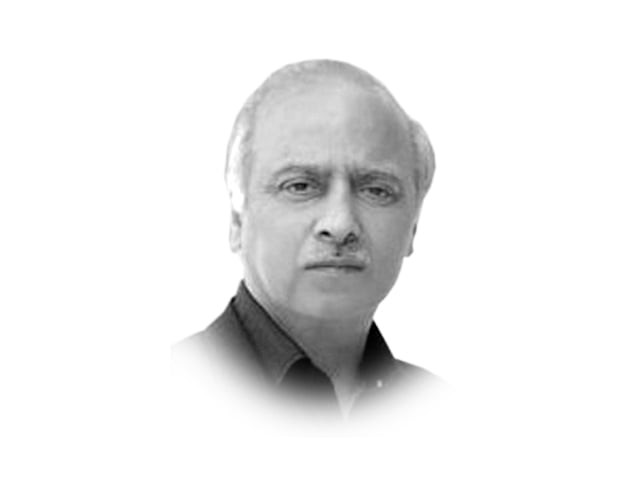Political parties and democracy?
Sharifs, Zardaris or others award party tickets for National Assembly according to their whims. Merit hardly matters.

Political parties and democracy?
“Parties do not follow their own constitutions. They hold no party elections. They function for years on an ad hoc basis. Sometimes there has been a tyranny of the minority over the majority because of undemocratic functioning.[A] few persons ... strangulate the ... aspirations of the members of the party at the grass roots and keep the party under their strict control…” Shakhdher wrote as far back as in September 26, 1980.
Mr Shakhdher also proposed parliamentary legislation which could make it obligatory for every political organisation to register their body and regulate their functioning by laying down broad outlines and norms.
As you read these lines penned by S.L Shakhdher, one of India’s former chief election commissioners, you start imagining the conduct and configuration of mainstream Pakistani political parties – as if Shakdher were talking about the familial dynasties or lone personalities masquerading as Pakistan’s lead democrats – Sharifs, Zardaris, Gilanis, Altaf Hussein, scions of Wali Khan, or even Imran Khan.
Jamaat-e-Islami, regardless of its strong ideological bent, most probably stands out as the singular religio-political entity that follows the democratic tradition of regularly holding elections within. Similarly, Altaf Hussain’s vitriolic speeches and autocratic style of party management aside, the MQM, too, distinguishes itself in the sense that the party boasts a leadership that comes from the lower and middle urban class.
As far Imran Khan, we are not likely to see emergence of his dynasty for the simple reason that his sons most probably won’t aspire to jump into the callous political fray of Pakistan. So far, the PTI and the Imran Khan’s roaring rhetoric has revolved around his own person, disallowing Shah Mehmood Qureshi or the party president Javed Hashmi to take stage at critical moments.
Unlike the predominant features of the South Asian landscape, political leadership in the Americas and in most of Europe emerges slowly, and systematically through party hierarchies. In the US, the primaries allows forceful individuals with strong integrity, often little known nationally, to rise and challenge incumbents. Its true for the entire electoral ladder up to the presidency i.e., aspirants to the Senate, the House of Representatives, the governorship and membership of the State Legislatures may need approval of the party high-ups but are not necessarily dependent on them. Precisely this system facilitated President Obama’s rise to the White House. Political parties in most of European countries, too, are rooted in the district and sub-district levels of party infrastructure, which serve as the primary ladder for any hard-working, dedicated worker’s upward mobility.
What is ironic, in sharp contrast to the American and European parties’ conduct, is that politicians in both India and Pakistan themselves drafted their respective constitutions and tirelessly avow their commitment to the ideals of democracy. But these politicians and their parties are largely undemocratic. Even if they hold internal elections they hardly qualify as elections when measured against the globally acknowledged and practiced yardstick of free and fair election.
Also, the secret in elevation to some important position in the party hinges either on the sweet will of the supreme leader or the “smartness” of the aspirant him/herself; several new faces that we saw in the National Assembly and the senate, owed their rise primarily to the person of General (retd.) Pervez Musharraf, who would introduce those young MNAs/Senators as the future of Pakistan.
The way most leaders climbed their way back into the inner core of Pakistan Peoples Party (PPP) after the 2008 general elections, also explained the stranglehold of its mercurial and accidental chairperson Asif Ali Zardari; those initially uncomfortable with him or those who dissented, soon compromised the “futility of their principles position” and opted to join the bandwagon – raised on a questionable will left by Benazir Bhutto.
The sway that Sharif’s hold over the PML-N also exemplifies the dynastic way of party management.
Whether Sharifs, Zardari, Fazlur Rahman, or many others, they decide the award of party tickets for the National Assembly and the Senate mostly according to their own whims. Merit hardly matters. The loss of NA-1 in the by-election last year to the ANP is the best example of such whimsical attitude; much against the advice from within the party, Imran Khan opted for a candidate whom the majority of Peshawarites hardly approved, and hence a thumping defeat for him.
No surprise therefore that the youth in Pakistan is frustrated, agitated and lacks trust in the leadership and the system they lord over, and times take up options that defy logic.
Published in The Express Tribune, September 3rd, 2014.
Like Opinion & Editorial on Facebook, follow @ETOpEd on Twitter to receive all updates on all our daily pieces.














COMMENTS
Comments are moderated and generally will be posted if they are on-topic and not abusive.
For more information, please see our Comments FAQ